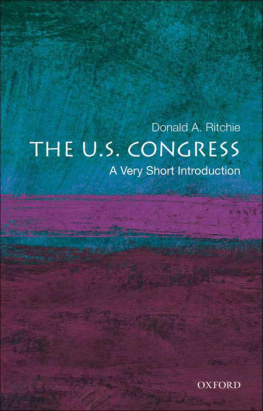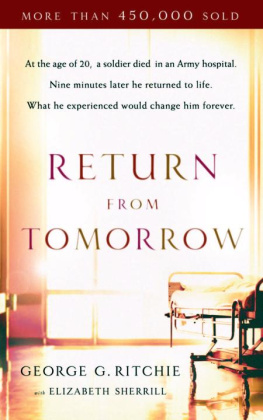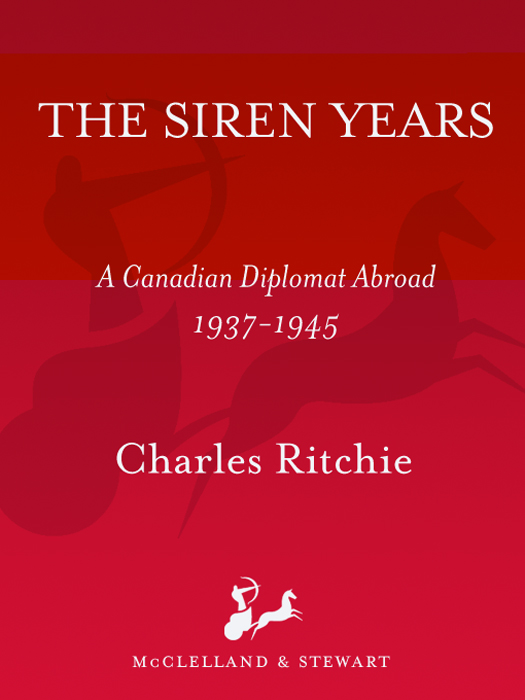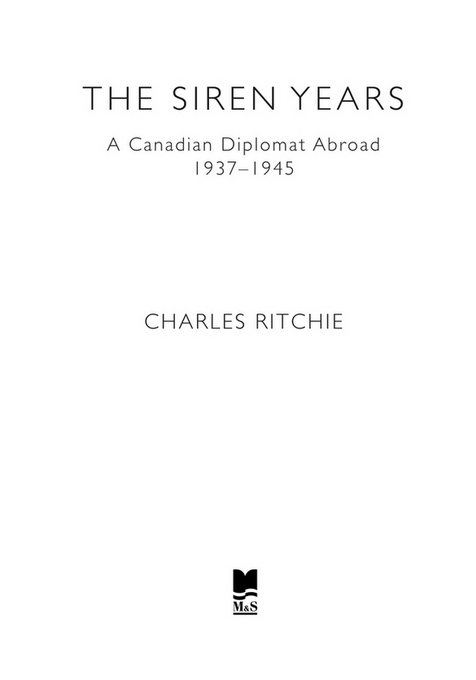ALSO BY CHARLES RITCHIE
An Appetite for Life
Diplomatic Passport
Storm Signals
My Grandfathers House
Copyright 1974 Charles Ritchie
Originally published in hardcover by Macmillan of Canada 1974 McClelland & Stewart trade paperback edition published 2001 by arrangement with The Estate of Charles Ritchie
All rights reserved. The use of any part of this publication reproduced, transmitted in any form or by any means, electronic, mechanical, photocopying, recording, or otherwise, or stored in a retrieval system, without the prior written consent of the publisher or, in case of photocopying or other reprographic copying, a licence from the Canadian Copyright Licensing Agency is an infringement of the copyright law.
National Library of Canada cataloguing in publication data
Ritchie, Charles, 1906-1995
The siren years: a Canadian diplomat abroad, 1937-1945
eISBN: 978-1-55199-678-3
1. Ritchie, Charles, 1906-1995 Diaries. 2. Diplomats Canada Diaries.
I. Title.
FC 581. R 5 A 3 2001 327.710092 C 00-932577-8
F 1034. R 573 A 3 2001a
We acknowledge the financial support of the Government of Canada through the Book Publishing Industry Development Program for our publishing activities. We further acknowledge the support of the Canada Council for the Arts and the Ontario Arts Council for our publishing program.
McClelland & Stewart Ltd.
75 Sherbourne Street,
Toronto, Ontario
M 5 A 2 P 9
www.mcclelland.com
v3.1
CONTENTS
FOREWORD
It was with adolescence that the diary addiction fixed its yoke on me a yoke which in the succeeding fifty years I have never been able entirely to shake off, although there have been merciful intervals of abstinence. The habit had begun even earlier had sprouted furtively when I was a schoolboy. Its seed was perhaps already sown when I would write on the front of school books, Charles Stewart Almon Ritchie, Kings Collegiate School, Windsor, Nova Scotia, Canada, North America, The World, The Universe, September 23rd, 1918, 3:17 p.m. an early compulsion to fix myself in space and in time. Once given over to this mania there was no cure for it. With obstinate obsessiveness I continued to scribble away. Now the toppling piles of my old diaries are mountains of evidence against me, but I still postpone the moment to destroy them. Their writing and subsequent concealment were intentionally secretive to have them discovered and read would have meant to be caught in the practice of solitary vice.
The diaries included in this book begin in Washington in 1937 and end in Ottawa in 1945 but are in the main my record of the years I spent in London during the Second World War. They show the scenes and people described as viewed by an outsiderinsider one immersed from boyhood in English life but not an Englishman.
The writer was during these years an officer of the Canadian Foreign Service but these are not diplomatic diaries in any sense of that word. The deliberate exclusion of official business from the record leaves the odd impression that I was floating about London in idleness. One might well ask not only, What was his war effort? but What did the Canadian Government pay him for? The answer is that I was an obscure and industrious junior diplomatic official who was thrown by chance and temperament into the company of a varied cast of characters who lived those years together in London in the stepped-up atmosphere of war, with its cracking crises, its snatched pleasures, and its doldrums. The diaries are personal too personal to see the light of day? I once would have thought so. Now thirty years later the personal seems to me to merge into we of wartime London days. I resist any temptation to patronize or justify the writer. His faults, follies, and errors of judgement show plainly enough. To paper them over would seem a smug betrayal of my younger self. The diaries are as I wrote them at the time, save for occasional phrases which have been altered for the sake of clarity.
While I spare the reader a leisurely tour of my origins, childhood, and early manhood, a brief backward glance may be helpful in making the narrative and the narrator more comprehensible.
I was born at our family home, The Bower (which crops up from time to time in these diaries), then on the outskirts of Halifax, Nova Scotia, in 1906. The Halifax of those days at any rate the Halifax of my mother and her friends looked back to its past as a garrison town and a base for the Royal Navy. I was brought up in an atmosphere which must be incomprehensibly remote to modern Canadians in which everything British was Best and Upper Canada was a remote and unloved abstraction. Yet my family had been in Nova Scotia for four or five generations. Their devotion to Crown and Empire was a romantic fidelity, quite different from the satisfied acceptance of the English by themselves as English. They might look to England but it was hard for the individual Englishman to pass through the eye of their needle. They were Nova Scotians first, Canadians second. They were North Americans with a difference and they clung tenaciously to the difference. They belonged to Nova Scotia, the land where memories are long, legends, loyalties, and grudges unforgotten, a land where a stranger should tread warily.
My mother was widowed when I was ten. My father, twenty-five years older than she, was a barrister and a brilliantly effective one, to whom the law, which he had in his bones from generations of lawyers and judges, was a devotion. My mother was left with two boys to bring up, my brother Roland and myself. She tackled the job with love and a touch of genius. Never possessive, she held us by the magnetism of her personality.
Our home always seemed full of people coming and going, relations and near-relations, friends young and old, and those whom my mother was sorry for or thought to be lonely. Then there was our own coming and going as a family to and fro from England in the slow boats from Halifax to Liverpool, until England began to seem the other half of ones life.
Our education never stood still in one place in and out of schools on and off with tutors now at a preparatory school in England, then back to Nova Scotia, then to an Anglican concentration camp of a boarding school in Ontario.
It was in 1921 while at the squalid age of fifteen I was incarcerated in this establishment that an envelope emblazoned with the Arms of Canada reached me as unexpectedly as the invitation to Cinderella to attend the court ball. The letter within was from Sir Robert Borden, then Prime Minister. He and my father had been law partners and lifelong friends. His kindly letter now informed me that he hoped in due course to see established a Canadian Foreign Service and that hearing (from my mother) of my interest in international affairs he suggested that one day I might be interested in such a career. Thus was planted the germ of an ambition.
As for my later education it seemed destined to extend to infinity, from Kings University in Halifax to Oxford to Harvard to the cole Libre des Sciences Politiques in Paris and back to Harvard. In no hurry to earn my own living, I was in danger of becoming a perpetual student. There were intermissions, a short-lived spell of journalism in London, an amateurish but exhilarating bout of teaching French irregular verbs in an experimental school in Canada, but no settled profession until the Victorian Gothic portals of the Department of External Affairs opened in August 1934 to receive me as an acolyte third secretary.










